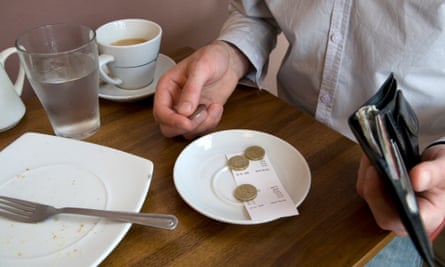
In Germany it seems to be pretty much automatic, pretty much all the time. In France and Spain it all depends – presumably on social subtleties that you have to be French or Spanish to understand. In Italy, why would you even bother?
When, and how much, to tip is a question that has been vexing visitors to Europe for as long as people have been travelling around the continent. Outside their own country, it seems even Europeans don’t know the answer.
According to new polling by YouGov in six EU countries, Britain and the US (where, as most visitors know but may be reluctant to acknowledge, gratuities may make up more than half your waitperson’s income), Europeans are deeply divided on tipping.
In restaurants, for example, 72% of respondents in Germany told the pollster they “typically” tipped: almost the same as the US. In the UK, where an optional service charge of about 12.5% is usually included, 55% said they left a gratuity.
The figure in Spain, where service is often included in restaurant bills but diners can leave optional tips, was 46%, while in France, where every price on a restaurant menu already includes 15% for service, 34% of people said they generally tipped on top.
Even in Sweden, where tips are generally not expected, the figure was 31%. But only 24% of Italians said they would typically leave a gratuity after a meal out – with a rather greater proportion (29%) admitting they never left a cent.
graphic on tipping in Europe
The divide was equally plain where service charges, optional or otherwise, were less common. At the hairdresser’s, for example, 56% of Germans said they usually tipped, against 32% of Britons, 25% of Spaniards, 21% of French people – and just 8% of Italians.
Hotels and taxis showed a similar pattern: 37% of Germans said they usually tipped concierges and 40% tipped taxi drivers – more, even, than Americans. For Italians, however, the figures were 14% and 3%, with other Europeans somewhere in between.
Bar staff in Germany, likewise, could expect half of their customers to be regular tippers, compared with 47%, 24% and 16% in the US, France and Spain. Only 9% of Italians said they routinely left coins on the counter when paying for their drink.
In terms of amounts, Britons and Germans were most likely to leave 10%; Italians, Spaniards and French 5%; and Americans 20%. By far the most common reason for tipping was “to reward good service”, followed by “I feel I have to” – although other reasons, notably in Germany, included: “That’s just how it should be.”
 View image in fullscreenOnly 24% of Italians said they would typically leave a gratuity after a meal out. Photograph: JackF/Getty/iStockphoto
View image in fullscreenOnly 24% of Italians said they would typically leave a gratuity after a meal out. Photograph: JackF/Getty/iStockphoto
A startling 42% of respondents in the US, however, and 17% of Germans – by far the most in Europe – confessed they would tip sometimes or often even if the service was “terrible”, indicating that for some, tipping is not about quality of service at all.
The findings of the survey will come as a surprise in Germany, a country that does not generally think of itself as a nation of happy distributors of Trinkgeld (the word, in a similar vein to pourboire in French, means “drinking money”).
Nor is Germany a country whose service staff are particularly customer friendly: in Berlin, a glass of beer or a plate of food is often served in a huff rather than with a smile. Not for nothing is Servicewüste Deutschland (“Germany is a service desert”) a thing.
Yet the data reflects a clear trend: Germans tend to hand over a few extra coins, irrespective of how they have been treated. They are the nation in Europe least likely to not tip even for poor service, and the most willing to pay extra for average service.
A continuing fondness for cash may be a factor, with many taxi drivers and bars still refusing payment by card. A growing awareness of labour shortages in the catering sector could also explain a change in attitude.
skip past newsletter promotion
Sign up to This is Europe
Free weekly newsletter
The most pressing stories and debates for Europeans – from identity to economics to the environment
Enter your email address Enter your email address Sign upPrivacy Notice: Newsletters may contain info about charities, online ads, and content funded by outside parties. For more information see our Privacy Policy. We use Google reCaptcha to protect our website and the Google Privacy Policy and Terms of Service apply.
after newsletter promotion
With many bars and cafes, even in big cities, reducing their opening hours due to a post-pandemic lack of staff, some barkeepers say their customers have recently become more generous tippers.
But if German tipping habits seem ingrained, they are not always observed. Adding 10% is a generally accepted rule, but not always followed. “Most customers pay me €2-3 extra,” said Mehmet Dogan, a Berlin taxi driver.
“But the 10% rule doesn’t apply to longer journeys. I don’t think I have been given a €5 tip in 20 years of doing my job. If someone slipped me a fiver, I’d assume they made a mistake.”
 View image in fullscreenGermans tend to hand over a few extra coins, irrespective of how they have been treated. Photograph: Graham Turner/The Guardian
View image in fullscreenGermans tend to hand over a few extra coins, irrespective of how they have been treated. Photograph: Graham Turner/The Guardian
Matthew Smith, YouGov’s head of data journalism, said some may be surprised by the revelation that “Germans are just as likely [as Americans] to tip service workers – not least because service attitudes in Germany have previously been so bad that the government felt the need to address it before the country hosted the 2006 World Cup.”
In Italy, Tiziana Nicolosi, who manages Quirino, a bar and restaurant in central Rome, said the country simply “doesn’t have a culture for tipping. We’re not like Americans or the British. We might do it occasionally, but it’s not something that is expected.”
It is rare to see a tip box by the till in a bar or restaurant in Italy, with some owners deeming such a display unbecoming. Instead, they appreciate the loyalty of regular clientele, who may occasionally leave a little extra after their drink or meal in recognition of quality and service, rather than out of obligation.
Many Italians, however, leave the change after paying a bill. “If a coffee costs 90 cents, then a customer will usually give €1 and let us keep the change,” said Riccardo Conti, 34, a waiter in Rome. For some customers, leaving the small change is simply a matter of not wanting to hang around, he added.
Personally, Conti said, he bucks the trend of non-tipping Italians. “I always leave a tip, mainly in bars and restaurants,” he said, adding it was “very subjective”.
“It all depends on the individual. It’s a gesture you might see more from people in the south, who are generally more warm and generous than in the north.”



